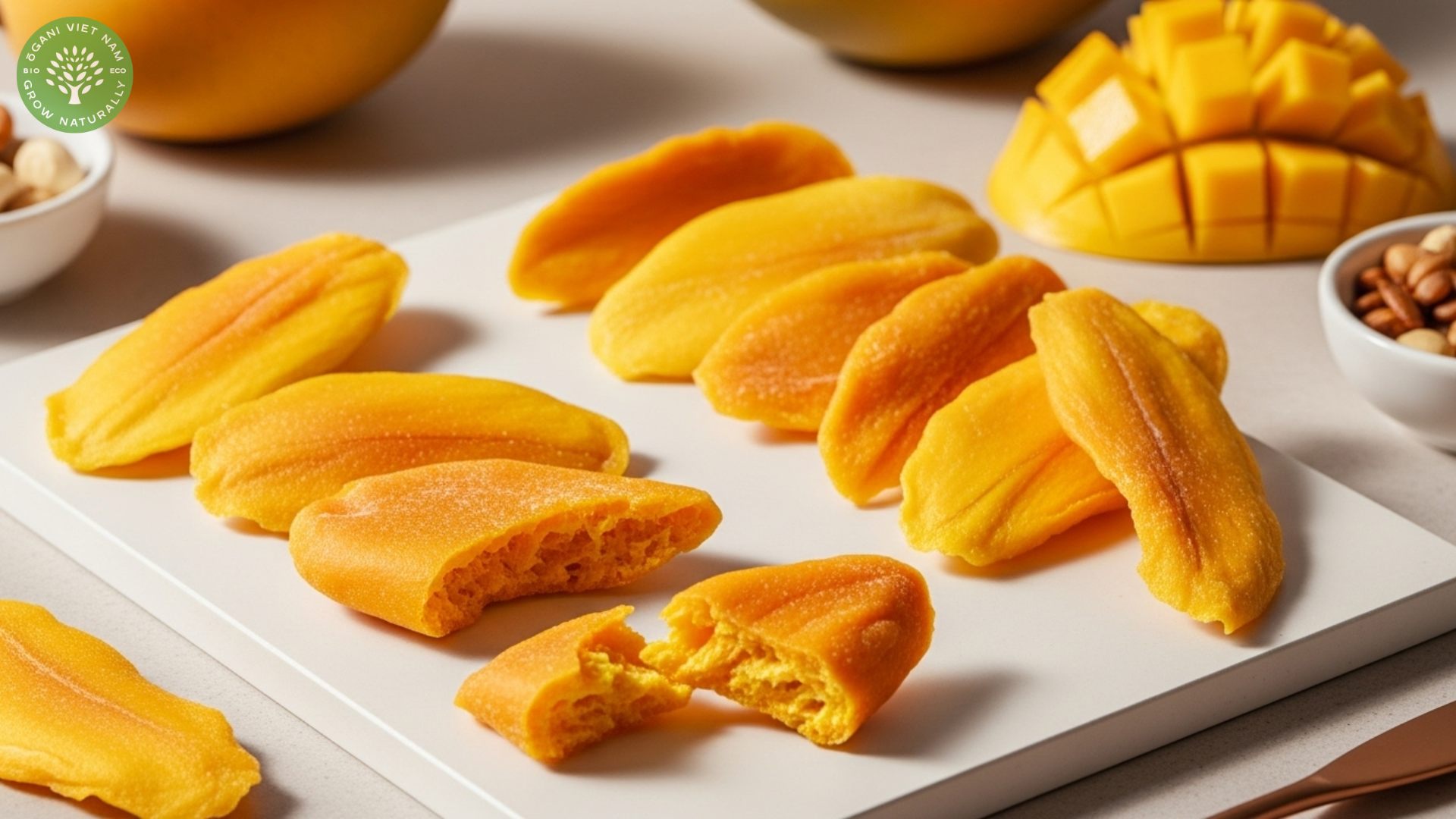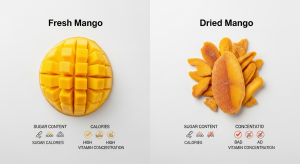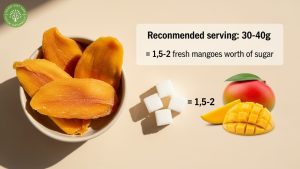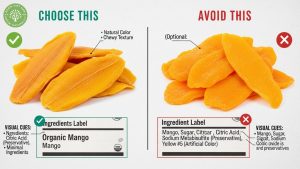
Are dried mangoes healthy? Yes, dried mangoes can be part of a healthy diet when consumed in moderation. They’re packed with vitamins, fiber, and antioxidants, but their concentrated sugar content means portion control is key.
At Ogani VN, we get this question constantly from our customers who love munching on these chewy, tropical treats. The truth is, dried mangoes sit in that interesting middle ground between healthy snack and occasional indulgence – and understanding the nuances makes all the difference.
Are dried mangoes healthy from a nutritional standpoint?
Dried mangoes retain most of the nutrients found in fresh mangoes, just in a more concentrated form. When the water gets removed during the drying process, you’re left with a nutrient-dense snack that packs quite a punch in a small serving.
A typical 40-gram serving (about 3-4 pieces) of unsweetened dried mangoes contains approximately 120-140 calories and delivers impressive amounts of vitamin A, vitamin C, and dietary fiber. The vitamin A content is particularly noteworthy – dried mangoes provide about 15% of your daily needs in just one serving, supporting eye health and immune function.
The fiber content shouldn’t be overlooked either. That same serving gives you roughly 2-3 grams of fiber, which helps with digestion and can contribute to feeling satisfied longer. Plus, dried mangoes contain potassium, iron, and various B-vitamins that support energy metabolism.
Are dried mangoes healthy compared to fresh mangoes?

Here’s where things get interesting, and honestly, a bit complicated. Fresh mangoes and dried mangoes are like comparing apples to… well, concentrated apples.
Nutrient concentration differences
When mangoes are dried, the water content drops from about 85% to around 15-20%. This concentration effect means you’re getting more nutrients per gram, but also more natural sugars and calories. A fresh mango might have 15 grams of sugar per 100 grams, while dried mango can contain 60-70 grams per 100 grams.
The vitamin C content does decrease somewhat during the drying process, but dried mangoes still retain about 60-70% of the original vitamin C levels. Antioxidants like beta-carotene actually become more concentrated, which is why dried mangoes often have that deep, rich color.
Satiety and blood sugar impact
Research suggests that fresh mangoes may be better for blood sugar control and satiety compared to their dried versions. The fiber and water content in fresh mangoes slow down sugar absorption, while dried mangoes can cause a quicker spike in blood glucose levels.
We’ve noticed that customers who enjoy dried mangoes with a handful of nuts or a piece of cheese tend to feel more satisfied and experience less of that sugar rush-and-crash cycle.
Are dried mangoes healthy despite their sugar content?
Let’s be real about this – the sugar content in dried mangoes is probably higher than you think, and definitely higher than what most people consider when snacking. This is often the biggest concern people have when asking “are dried mangoes healthy?”
Those 3-4 pieces we mentioned earlier? They contain roughly the same amount of natural sugars as eating 1.5 to 2 whole fresh mangoes. Now, most people wouldn’t sit down and eat two entire mangoes in one go, but polishing off a small bag of dried mango? That happens pretty easily.
The key distinction here is between “added sugar” and “natural sugar.” Many dried mango products are unsweetened, meaning no sugar has been added during processing. However, the natural fruit sugars are still highly concentrated. Some brands do add extra sugar, sulfur dioxide for preservation, or other sweeteners – always check the ingredient list.
For context, a 40-gram serving of dried mango contains about 24-28 grams of natural sugar. That’s roughly equivalent to 6-7 teaspoons of sugar, though it comes packaged with fiber and nutrients rather than being empty calories.

Specific health benefits of dried mangoes
Despite the sugar concerns, dried mangoes do offer several legitimate health benefits when consumed thoughtfully. So are dried mangoes healthy beyond just their nutritional numbers? The answer lies in understanding how these benefits can fit into your overall eating pattern.
Digestive health support
The fiber content in dried mangoes can support healthy digestion and regular bowel movements. The pectin fiber, in particular, may help with cholesterol management and provides fuel for beneficial gut bacteria.
We’ve had customers tell us that a few pieces of dried mango help with their digestion, especially when they’re traveling or their regular eating schedule gets disrupted. The fiber content, while not as high as some other dried fruits, still contributes meaningfully to daily fiber intake.
Antioxidant properties
Dried mangoes contain various antioxidants, including beta-carotene, which gives them their orange color. These compounds help protect cells from oxidative stress and may support overall health. The concentration process actually increases the antioxidant density compared to fresh mangoes.
Energy and B-vitamin content
The natural sugars in dried mangoes provide quick energy, while B-vitamins support energy metabolism at the cellular level. This makes them potentially useful as a pre-workout snack or afternoon energy booster – just watch the portion size.
Choosing the healthiest dried mango options
Not all dried mangoes are created equal, and the processing method significantly impacts the final nutritional profile. When customers ask us “are dried mangoes healthy?”, we always emphasize that the answer depends heavily on which product you choose.

Look for organic, unsweetened varieties without added preservatives like sulfur dioxide. Some brands use just mangoes – no additives whatsoever. These tend to have a more natural color (less bright orange, more golden) and a chewier texture.
At Ogani VN, we recommend reading ingredient lists carefully. The ideal dried mango product should list only one ingredient: mangoes. Avoid products with added sugars, corn syrup, or artificial colors.
Consider the source mangoes as well. Mangoes picked at peak ripeness and properly dried tend to have better flavor and nutritional content compared to those processed from underripe fruit.
Frequently Asked Questions
How much dried mango should I eat per day? A reasonable serving is 30-40 grams (3-4 pieces) as an occasional snack. This provides nutrients without excessive sugar intake. Pairing it with protein or healthy fats can help balance blood sugar response.
Are dried mangoes good for weight loss? In moderation, yes. The fiber content can help with satiety, but the calorie density means portion control is crucial. They’re better than many processed snacks but shouldn’t be unlimited.
Can diabetics eat dried mangoes? Diabetics should approach dried mangoes cautiously due to their high natural sugar content. This is a common concern when people ask “are dried mangoes healthy for specific health conditions?” Small portions paired with protein may be acceptable for some, but it’s best to consult with a healthcare provider.
Do dried mangoes cause digestive issues? Some people may experience digestive discomfort from the concentrated fiber and sugars, especially if consumed in large quantities. Start with small amounts to gauge tolerance.
The bottom line
So are dried mangoes healthy? Dried mangoes can absolutely be part of a healthy eating pattern – they’re nutrient-dense, provide beneficial antioxidants and fiber, and satisfy sweet cravings naturally. The key is treating them as a concentrated fruit rather than a unlimited snack.
At Ogani VN, we believe in honest nutrition information that helps you make informed choices. Dried mangoes aren’t health food magic bullets, but they’re certainly better than many processed alternatives when portion size is respected.
Ready to try high-quality, organic dried mangoes? Browse our selection of premium, unsweetened dried tropical fruits and discover the difference that careful sourcing and minimal processing makes. Your taste buds and your health will thank you.
Read more:
1 Are Dried Mangoes Healthy? The Complete Guide To This Sweet Tropical Snack
2. Organic Dried Mango: Your Complete Guide To Healthy Snacking
3. How to Store Dried Mango & Maximize Shelf Life (Pantry, Fridge, Freezer)
4. Dried Mango vs Freeze‑Dried Mango: Nutrition, Texture & Best Uses
5. How to Rehydrate Dried Red Dragon Fruit (3 Methods) + What to Make with It

